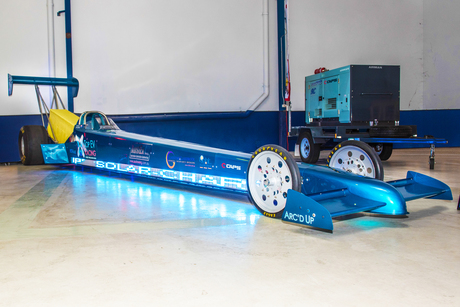Solar-powered dragster setting out to break records

CAPS, an Australian provider of compressed air and power solutions, has become a supporting partner of Top EV Racing — which is setting out to develop the world’s quickest and fastest electric race car charged from solar power.
The Arc’d Up Dragster is setting out to break several world land-speed records for acceleration and speed, aiming to achieve 0 to 530 km/h in 4.5 seconds at over 7 g-force (which is twice the accelerating force of NASA’s space shuttles)!
CAPS has supported this ‘fully sustainable’ attempt at a world record by providing a CAPS B3800/50 reciprocating compressor workshop kit, along with several CAPS air tools. Michael Fragomeni, founder and driver of the Top EV race car, said: “The compressor provided by CAPS is an absolute powerhouse for output. It’s being put to task here in our workshop.”
CAPS Malaga Centre Manager Mark McGrath said, “We’re very excited to be working with Michael as he aims not to just set electric car records, but several speed racing world records. His car will be the quickest, fastest, cleanest extreme electric race car, and it’s all run off solar energy.”
Aside from attempting to break records, the project seeks to engage local communities, businesses and trades to promote sustainability. The venture aims to be carbon-negative, with trees being planted to offset the human impact of the project — to date, 569 trees have been planted.
The CAPS B3800/50 3 hp reciprocating piston air compressor used in the Top EV workshop is a fully portable electric-driven unit, giving the mechanics flexibility to move their compressed air source around their worksite, wherever it is needed.
Novel energy storage system to decarbonise buildings
Researchers have designed a novel energy storage system that charges from surplus renewable power...
Non-destructive solar cell monitoring technique discovered
UNSW researchers can now monitor solar cells at a microscopic level while they are operating to...
Tangkam BESS project gets grid connection approval
Hanwha Energy Australia's BESS project gets green light to advance towards construction and...







